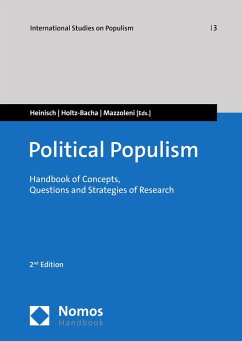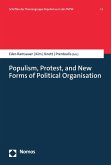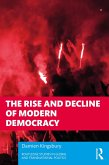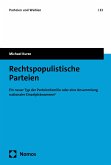Der Populismus stellt die größte politische Herausforderung für westliche Demokratien seit dem Zweiten Weltkrieg dar. Wahlerfolge populistischer Parteien und Akteure, der Brexit, die Präsidentschaft von Donald Trump oder Kampagnen gegen Maßnahmen zur Eindämmung der Pandemie sind Ausdruck dieses Phänomens, in dem die Wählerschaft gegen vermeintliche Eliten mobilisiert wird. Das überarbeitete und erweiterte Handbuch Political Populism bietet eine umfangreiche theoretische und empirische Einführung in Erscheinungsformen, Ursachen und Auswirkungen des Populismus insbesondere in den Demokratien Europas sowie Nord- und Südamerikas. Der Fokus liegt hierbei auf der Erklärung des Phänomens als Folge einer Legitimationskrise des repräsentativen Systems sowie den Kontroversen und Grenzen in der derzeitigen wissenschaftlichen Auseinandersetzung. Das Phänomen wird hierbei vor allem aus politikwissenschaftlicher und kommunikationswissenschaftlicher Perspektive beleuchtet. Das Handbuch bietet außerdem eine umfangreiche Analyse der Auswirkungen des Populismus auf verschiedene Politikbereiche wie die Umwelt-, Gesundheits- oder Wirtschaftspolitik. Mit Beiträgen von Tjitske Akkerman, Manuel Anselmi, Wolfgang Aschauer, Hans-Georg Betz, Cecilia Biancalana, Paul Blokker, Giuliano Bobba, María Esperanza Casullo, Carlos de la Torre, Paula Diehl, Sarah C. Dingler, Martin Dolezal, Marco Fölsch, Flavia Freidenberg, Sergiu Gherghina, Florian Habersack, Vlastimil Havlík, Kirk A. Hawkins, Reinhard Heinisch, Christina Holtz-Bacha, Robert A. Huber, Gilles Ivaldi, Philip Kitzberger, Benjamin Krämer, Maria Elisabetta Lanzone, Zoe Lefkofridi, Dietmar Loch, Miroslav MareS, Alfio Mastropaolo, Oscar Mazzoleni, Sergiu Miscoiu, Teun Pauwels, Franca Roncarolo, Saskia Pauline Ruth, Carlo Ruzza, Steven Saxonberg, Christian H. Schimpf, Damir Skenderovic, Sorina Soare, Lone Sorensen, Carlos H. Waisman, Carsten Wegscheider und Sandra Vergari. With a welcome expansion in cases and policy fields, the second edition of Political Populism: Handbook on Concepts, Questions and Strategies for Research brings together scholars from a range of disciplines to reflect on the fundamental challenge populism poses today. This Handbook is essential to every reader who wants to understand where populism comes from, how it manifests and how it influences policies, political actors and the very institutions that make democracy. Theoretically sophisticated, substantiated in its content yet approachable for the interest reader, this Handbook marks an important step in the appreciation of the complexity and consequences of this global phenomenon. Annika Werner, Australian National University Two decades of turbulent political history show that populism is here to stay, and to shape politics for a long time to come. It is considered a serious threat to traditional democratic institutions. That's why political and communication scientists have massively engaged in studying it, in explaining it, in analyzing its features and implications. Among the several recent scholarly productions, this Handbook is perhaps the best tool put in the hands of all those who want to get a multi-dimensional yet comprehensive understanding of political populism as it is developing in Europe and in the Americas. Definitely a must-have book! Gianpietro Mazzoleni, Università di Milano, Italy This highly readable and detailed Handbook synthetizes a wealth of accumulated and innovative research on contemporary populism in Europe and the Americas. Drawing the insights of a distinguished group of specialists, the volume presents a comprehensive and updated view of the vibrant field of populist studies. Its four sections and thirty-four chapters provide stimulating perspectives on the theory, politics, and communicational dimensions of populism as well on emerging areas of research.
Dieser Download kann aus rechtlichen Gründen nur mit Rechnungsadresse in A, B, BG, CY, CZ, D, DK, EW, E, FIN, F, GR, HR, H, IRL, I, LT, L, LR, M, NL, PL, P, R, S, SLO, SK ausgeliefert werden.









